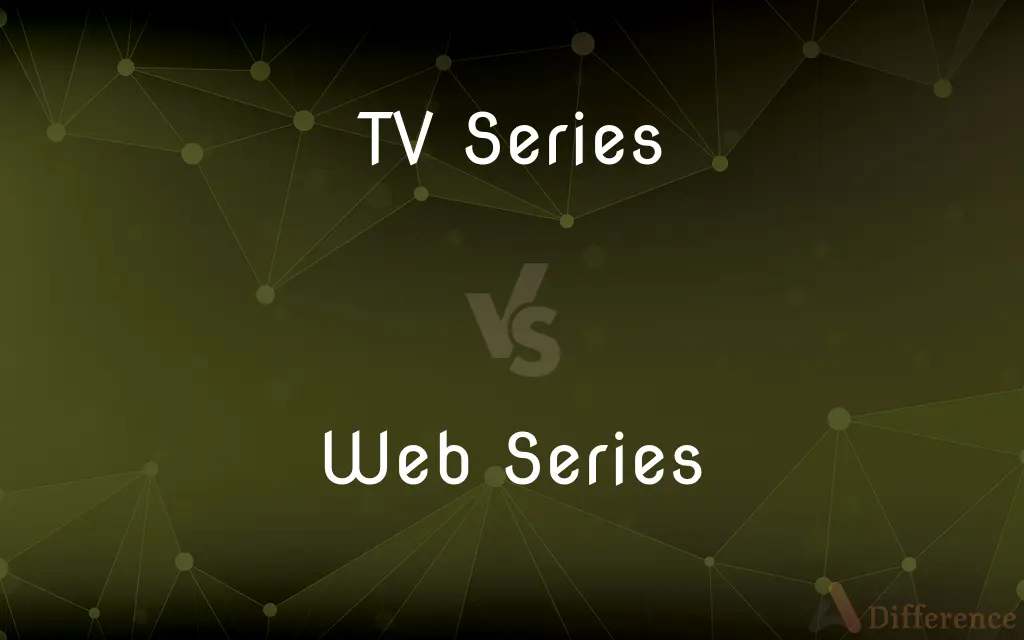TV Series vs. Web Series — What's the Difference?
By Tayyaba Rehman — Published on January 9, 2024
TV Series are produced for traditional television broadcast, while Web Series are created specifically for online platforms.

Difference Between TV Series and Web Series
Table of Contents
ADVERTISEMENT
Key Differences
TV Series: Broadcast through traditional television networks, either cable or satellite. Web Series: Distributed through internet platforms, such as streaming services or dedicated web channels.
TV Series: Often have larger budgets, backed by television studios or networks. Web Series: Can have varied budgets, often lower than TV series, and sometimes independently produced.
TV Series: Typically follow a scheduled weekly release pattern and are accessible through television subscriptions. Web Series: Usually available on-demand and can be accessed anytime online, often released all at once or in quick succession.
TV Series: Content may be subject to network standards and practices, with a focus on broader audience appeal. Web Series: Often enjoy more creative freedom, can cater to niche audiences, and can explore diverse or unconventional topics.
TV Series: Episodes generally adhere to standard lengths (e.g., 30 minutes, 1 hour) due to programming schedules. Web Series: More flexibility in episode length and format, not restricted by traditional broadcast time slots.
ADVERTISEMENT
Comparison Chart
Medium of Broadcast
Traditional television networks
Online platforms
Production and Funding
Larger budgets, television studio backing
Varied budgets, often independently produced
Accessibility
Scheduled release, TV subscriptions
On-demand access, online
Content Freedom
Subject to network standards
More creative freedom, niche topics
Episode Length
Standardized lengths
Flexible lengths, varied formats
Compare with Definitions
TV Series
Television programming produced in a serial format.
The TV series Game of Thrones attracted millions of viewers each week.
Web Series
A series of videos released primarily through the internet.
The Guild was an early example of a successful web series.
TV Series
A narrative-driven show distributed through cable or satellite.
Breaking Bad became an acclaimed TV series known for its storytelling.
Web Series
Series produced for and distributed through streaming services.
Stranger Things is a widely watched web series available on Netflix.
TV Series
A program made up of multiple episodes aired on television.
The Simpsons is one of the longest-running TV series.
Web Series
Digital content created for online viewing.
Carmilla is a popular web series adapted from a classic novel.
TV Series
A series of scripted episodes broadcast on television.
Friends is a popular TV series that originally aired on NBC.
Web Series
Online-based episodic content, often streamed.
House of Cards was one of the first major web series on Netflix.
TV Series
Regularly scheduled television content with recurring characters.
Grey's Anatomy is a medical drama TV series.
Web Series
A scripted or unscripted series distributed on web platforms.
The web series High Maintenance started online before moving to television.
Common Curiosities
Can web series become TV series?
Yes, some web series have been adapted into TV series or picked up by television networks.
Are web series more experimental than TV series?
Often, yes. Web series typically have more creative freedom and can explore niche or unconventional subject matter.
How do TV series and web series revenue models differ?
TV series often rely on advertising, syndication, and subscription fees, while web series may utilize streaming revenue, sponsorships, and ads.
Are TV series subject to more censorship than web series?
Generally, TV series face more stringent censorship and content restrictions compared to web series, which can often push boundaries.
Do TV series and web series differ in their storytelling techniques?
Yes, due to different platforms and audience expectations, TV series and web series may employ different storytelling techniques and pacing.
How has the rise of web series impacted traditional TV viewership?
The popularity of web series has significantly impacted traditional TV viewership, with many viewers shifting to on-demand, online content.
What are the primary platforms for web series distribution?
Web series are primarily distributed through streaming services like Netflix, Amazon Prime, YouTube, and others.
Do TV series have higher production quality than web series?
Traditionally, TV series had higher production quality, but this gap is narrowing as web series gain larger budgets and better production values.
Is binge-watching more common with web series?
Yes, binge-watching is more common with web series.
Do web series cater to a more global audience than TV series?
Web series often have a more global reach due to the accessibility of online platforms, while TV series may be limited to regional broadcasting.
How do subscription models affect the production of web series?
Subscription models on streaming platforms can provide more consistent funding for web series, influencing their production schedules and quality.
How do audience demographics differ between TV series and web series?
Web series often attract younger, more digitally-savvy audiences, while TV series can appeal to a broader demographic, including traditional TV viewers.
Are web series typically shorter in duration than TV series?
Often, web series episodes are shorter compared to traditional TV series, but this can vary greatly.
Can web series have interactive elements unlike TV series?
Yes, some web series incorporate interactive elements, allowing viewers to choose story outcomes, which is not feasible with traditional TV series.
Are actors and directors moving from TV series to web series?
Many actors and directors now work in both TV series and web series, as the latter have gained prestige and popularity.
Share Your Discovery

Previous Comparison
Latent Heat of Fusion vs. Latent Heat of Solidification
Next Comparison
Apostrophe S vs. S ApostropheAuthor Spotlight
Written by
Tayyaba RehmanTayyaba Rehman is a distinguished writer, currently serving as a primary contributor to askdifference.com. As a researcher in semantics and etymology, Tayyaba's passion for the complexity of languages and their distinctions has found a perfect home on the platform. Tayyaba delves into the intricacies of language, distinguishing between commonly confused words and phrases, thereby providing clarity for readers worldwide.













































